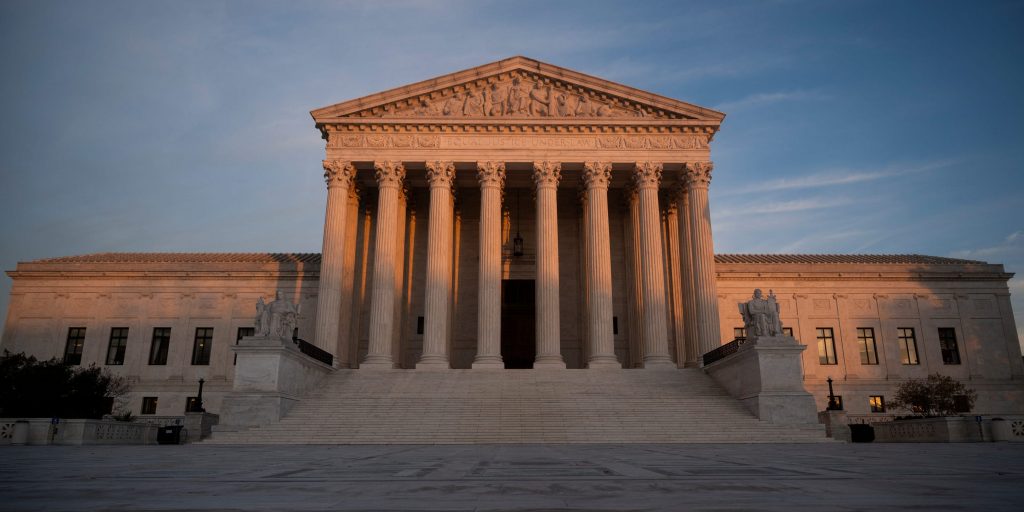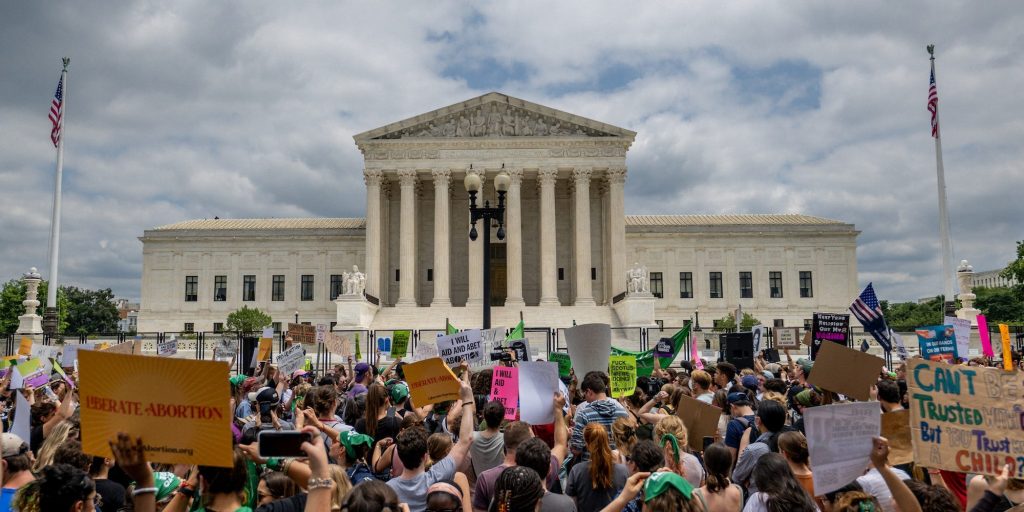- The Supreme Court on Friday overturned Roe v. Wade.
- Though rare, the move is not unprecedented: the court has overturned hundreds of its own decisions.
- Some of the most well-known cases in SCOTUS history overturned prior decisions.
The Supreme Court overturned Roe v. Wade on Friday, gutting the landmark case that has protected federal abortion rights for nearly 50 years and kicking the decision back to the states.
Though exceedingly rare, the move is not unprecedented. Since the Supreme Court was founded in 1789, justices on the top court have overturned hundreds of their own decisions, in certain cases resulting in some of the most lionized decisions throughout the court's history.
The exact number of Supreme Court reversals is difficult to pinpoint as the list is open to legal interpretation. The justices, for example, have disavowed past decisions without ever formally overturning them. But the Library of Congress, which tracks the list of overruled Supreme Court cases, puts the estimated figure at nearly 235 cases overturned throughout the court's 233-year history.
The phenomenon has become more common in modern years, according to David Schultz, a law professor at the University of Minnesota and author of "Constitutional Precedent in US Supreme Court Reasoning," who told The Washington Post earlier this year that the court's most recent chief justices — Chief Justice John Roberts and his predecessor William Rehnquist, who were both Republican appointees — have taken issue with precedents set by the more liberal courts of the 1960s and 1970s.
Among the court's overturned cases are some of the most well-known decisions in SCOTUS history.
Brown v. Board of Education
The 1954 case, which barred racial segregation in public schools, partially overturned a nearly 60-year-old Supreme Court decision.
In enshrining one of the keystones of the Civil Rights movement, the justices unanimously overturned Plessy v. Ferguson, an 1896 case wherein the court ruled in favor of allowing racially segregated public facilities as long as they were "equal."
In this cornerstone case, plaintiff Oliver Brown sued the Board of Education of Topeka, Kansas, after his young daughter was not allowed to attend the city's all-white elementary schools. Brown argued that schools for Black kids were unequal and invoked the "equal protection clause" of the 14th Amendment.
The case slowly worked its way through the judicial system, eventually landing at the top court. Thurgood Marshall, who would go on to become the Supreme Court's first Black justice thirteen years later, argued on behalf of the plaintiffs.
"We conclude that in the field of public education the doctrine of 'separate but equal' has no place," Chief Justice Earl Warren concluded, officially undoing the previous Plessy precedent. "Separate educational facilities are inherently unequal."
Miranda v. Arizona
The case that gave the country Miranda Rights, this 1966 decision invalidated two previous rulings from eight years prior.
In a 5-4 decision, the court found that police violated Ernesto Miranda's rights by failing to tell him that he could stay silent and ask for a lawyer to be present during his interrogation, during which he offered a written confession after being arrested in connection with a kidnapping and rape.
The top court ultimately ruled that the Fifth Amendment requires law enforcement officials to make suspects aware of their rights while in police custody. The decision invalidated both Crooker v. California and Cicenia v. Lagay, two 1958 cases that dealt with criminal suspects' constitutional rights to counsel before trial.
Miranda was back in front of the Supreme Court this month when the justices in a 6-3 decision struck a blow to Miranda Rights in shielding police from the possibility of monetary damages in cases where they fail to inform criminal suspects of their rights before obtaining statements which are later used against them.

Citizens United v. FEC
The infamous case remembered most for effectively granting corporations First Amendment rights also overturned previous decisions on political funding, including Austin v. Michigan Chamber of Commerce and parts of McConnell v. FEC.
The first case had upheld restrictions on corporate spending when it was in support of or against political candidates, while the latter cemented restrictions on campaign spending by corporations, tenets originally included as part of the McCain-Feingold campaign finance reform law.
In the 5-4 majority opinion, Justice Anthony Kennedy wrote that the Citizens United decision prohibits Congress from "jailing citizens, or associations of citizens, for simply engaging in political speech."
Obergefell v. Hodges
The 2015 case that established the federal right to same-sex marriage overruled the 1972 ruling of Baker v. Nelson.
A 5-4 majority led by Kennedy, who served as a frequent swing vote, ruled the Constitution affords same-sex couples in a marriage the same legal treatment as an opposite-sex couple and said denying them that right would "diminish their personhood."
But in light of Friday's Roe decision, Democrats and LGBTQ advocates have begun to worry that Obergefell could be overturned next — a possibility that Justice Clarence Thomas explicitly raised in his concurring opinion.
